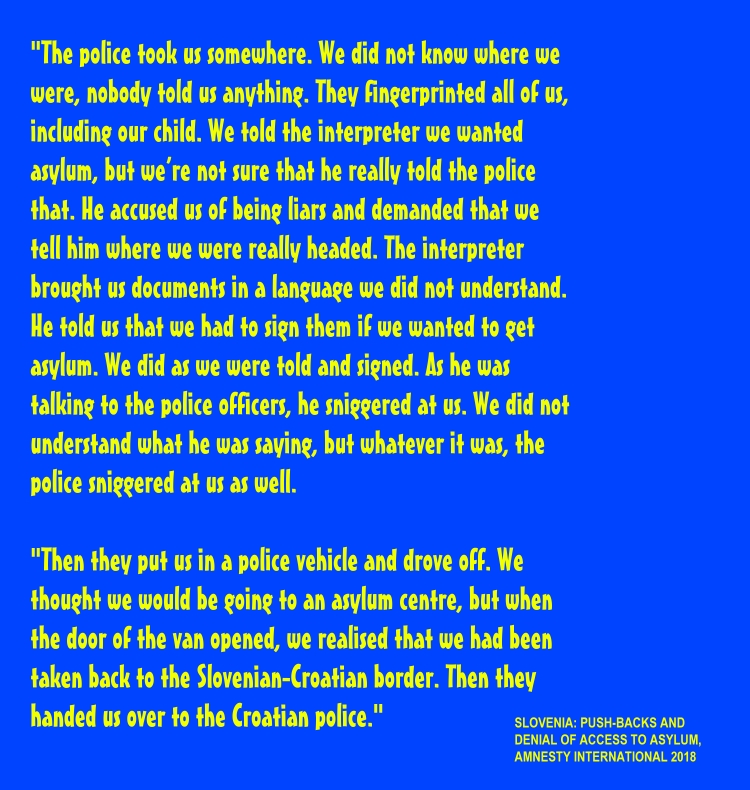
THE ANGLOPHONE RESIDENT AS A
MAGICAL SLAVE LABOUR CATEGORY IN THE SLOVENIAN PSYCHE
A European Parliament Resolution on linguistic and cultural minorities in the
European Community prepared by Mark Killilea and adopted by the European
Parliament in February 1994, item 9:
"Urges the Member States and the relevant regions and local authorities to
examine the possibility of concluding agreements to create trans-frontier
linguistic institutions for any minority languages or cultures existing in two
neighbouring countries or in several Member States simultaneously." [17]
The 1% native English-speaking EU population and Slovenia's share of it is not,
as the nation's laws and public seem to imagine, some kind of magical
supertourist, able to survive indefinitely and independently of anything the
country might be able to permit him by way of means of survival.
As the demand for free English lessons always exceeds the supply, the
economically rational answer for the Anglophone in Slovenia is to become a
hermit and be as antisocial as possible.
Being a hermit is the only way to avoid all the hospitality. In public, the
Anglophone exerts a magnetic attraction for folk who "put up with evenings in
English just for my benefit".
Surrounding this throng is another layer, getting jealous of all the attention
the foreigner is receiving. And, it seems, threatening anyone suspected of not
being fake enough about it.
When it gets to the point where strangers are shouting at you in public it's
time to go underground. When daily missions are like swimming through treacle
because of the language, you save your energy for the critical ones. The hermit
option is how the Complainant has responded.
Minimising human contact became preferable to being picked at by vultures. It is
a small win, in a small-mindedness race, with a small-minded race.
In Ptuj, minimising communication successfully reduced mischaracterisation,
exaggeration, interrogation, suspicion, exploitation, discrimination, and fake
adulation.
[80]
At the same time an economic equilibrium was
reached, where nothing is being taken away from the foreigner without payment.
His successful magical integration according to Slovenian market rules is
complete.
We have seen other magical categories in Slovenia: Ukrainian refugees
fast-tracked without the need to go into an asylum centre, Syrians and Afghans
tricked by translators and police into waiving their claims and returned to the
Croatian border.

"While the testimonies documented by Amnesty International, do not point to violent or abusive police practices in Slovenia, people who spoke with the organization frequently complained about unprofessional and inappropriate conduct of individual interpreters in Slovenia who, in some cases, refused to translate and intimidated and bullied migrants and refugees. Many of them said they were forced to sign papers they did not understand before being deported to Croatia and then onward to Bosnia and Herzegovina.
"A family from Iran described how they were threatened with deportation. 'When we
were given papers to sign, the interpreter said that if we didnít sign, we would
go to prison for six months. So we signed. We didnít really know what we were
signing; it was all in Slovenian.'" [19]
Same country.
With their magical powers, the good types of foreigner can set up a firm -
without any of the government offices involved: Upravna Enota, AJPES, the tax
office, ZZZS etc. - telling them they will be liable to a 3000 to 40000 euro
fine at the instant of their first non-Slovene communication with a customer.
Note how conversations with suppliers (and this includes the bureaucrats) can apparently be legally conducted in any language.
And without either of them even knowing anything
about the ZJRS. Because who would think they lived in a country with laws like
that, right?
An English language page of the Slovenian government [20]
suggests how easy it is for a non-EU citizen to establish a business. The words
"Slovene" and "language" are not mentioned at all.
According to the ZJRS, anyone following these instructions would only be
establishing a firm which could not do business with anyone inside the country.
This is a confidence trick.
How can I believe it's possible to set up a firm while remaining completely
innocent of the ZJRS? Because I did it.
Thus the ZJRS provides a neat arrangement enabling Slovenia to "get the
foreigner" by calling "the authorities".
Here you need to understand something about the Slovenian psyche which is that another's loss is considered as, or even more important and satisfying, than one's own personal gain.
"Slovenes forgive everything, except success."
- Ivo Boscarol, founder and CEO of Pipistrel
There is no word for Schadenfreude in Slovene.
Here's a lady shopped for selling dandelions
because her neighbours noticed she had a new jacket. [21]
And here's an article in the popular tabloid Slovenske Novice wherein patriotic
Slovenian locals are reminded how they can do that [22].
Other examples on request.